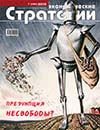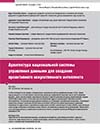Architecture of the National Data Management System for Creating Proactive Artificial Intelligence
DOI: 10.33917/es-7.165.2019.94-104
The article examines two approaches to formation of a national data management system (NDMS). The first approach is based on applying statistical data for predictive analytics to forecast the future. However, to ensure social progress, a proactive approach is required, aimed at creation of such a NDMS, which can be used to build the future implementing moral values. The authors substantiate that a proactive approach should be based on the principles of economic cybernetics, which allow to develop and introduce proactive artificial intelligence (AI) for improving the economic management efficiency. Its core is a Dynamic Model of Interbranch-Intersectoral Balance (MIIB), representing a system of algorithms for matching end consumers’ orders and manufacturers’ capabilities. The MIIB table, which presents all the relationships of economic agents, defines the architecture of the National Data Management System (NDMS) for the proactive AI functioning
References:
|
1. Schwab K. The Fourth Industrial Revolution: what IТ means, how to respond. Foreign Affairs, 2015, December. 2. Stat’ “vlastelinom mira”. Putin potreboval obespechit’ “suverenitet” Rossii v oblasti iskusstvennogo intellekta [Become the “Lord of the World”. Putin Called for Providing Russia’s “Sovereignty” in the Artificial Intelligence Sphere]. Forbes, 2019, May, 30, available at: https://www.forbes.ru/obshchestvo/376957-statvlastelinom-mira-putin-potreboval-obespechit-suverenitet-rossii-v-oblasti. 3. Veduta E.N. Tsifrovaya ekonomika privedet k ekonomicheskoi kibersisteme [Digital Economy will Lead to Economic Cybersystem]. Mezhdunarodnaya zhizn’, 2017, no 10. 4. Viner N. Kibernetika, ili Upravlenie i svyaz’ v zhivotnom i mashine [Cybernetics, or Management and Communication in the Animal and Machine]. Moscow, Nauka, 1983, 344 p. 5. We Need a New Science of Progress. Humanity needs to get better at knowing how to get better. The Atlantic. 2019, July, 30, available at: https://www.theatlantic.com/science/archive/2019/07/we-need-new-science-progress/594946/?utm_term=2019-07-30T17%3A33%3A42&utm_medium=social&utm_source=twitter&utm_campaign=the-atlantic&utm_content=edit-promo&fbclid=IwAR3luP91p_pevJCFtfMfuFDm8sgi28nIeDmSD-TdyjlUxgnbP-IhoRX3NSg. 6. Pochemu SSSR proigral ekonomicheskuyu voinu, a Zapad proigraet seichas [Why the USSR Lost the Economic War, and the West will Lose Now]. IA REGNUM, 2019, April, 7 aprelya, available at: https://regnum.ru/news/economy/2606859.html 7. Veduta N.I. Sotsial’no effektivnaya ekonomika [Socially Efficient Economy]. Moscow, REA imeni G.V. Plekhanova, 1999. 8. Plan vernulsya v ekonomiku [The Plan Returned to the Economy]. Habr, available at: https://m.habr.com/ru/post/459898/?fbclid=IwAR3Lxg8eXpx986pDh53PVaUHepIc8QOrdcC1IrUAZ7YLXLKQ7kLraDrmt94. 9. Veduta E.N. Mezhotraslevoi-mezhsektornyi balans. Mekhanizm strategicheskogo planirovaniya ekonomiki [Interbranch-Intersectoral Balance. Mechanism of Strategic Economic Planning]. Moscow, Akademicheskii proekt, 2016. |



